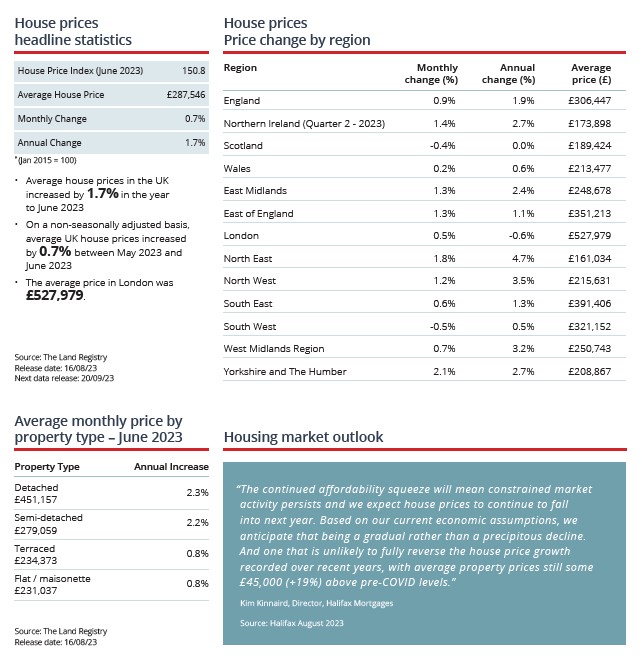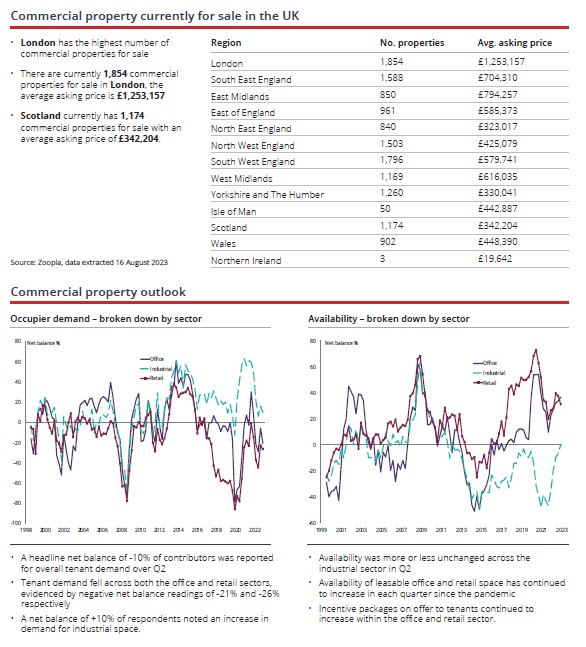UK growth rate exceeds expectations
The latest gross domestic product (GDP) statistics revealed that the UK economy grew more strongly than expected in June, although more recent survey data does suggest a renewed contraction looks ‘inevitable.’
Official data released last month by the Office for National Statistics (ONS) showed the economy grew by 0.5% in June. This figure was higher than any forecast submitted to a Reuters poll of economists, with the consensus prediction suggesting the economy would expand by just 0.2% across the month.
ONS said that June’s growth partly stemmed from the increased number of working days with the economy bouncing back from May’s extra Bank Holiday for the King’s Coronation. In addition, the warm weather provided a notable boost to trade in pubs and restaurants as well as activity in the construction sector.
June’s stronger than anticipated figure also resulted in the economy expanding across the second quarter as a whole. The increase of 0.2% between April and June again beat economists’ expectations with the consensus forecast from the Reuters poll pointing to a flat reading.
Data from a closely watched survey released towards the end of last month, however, suggests a third-quarter downturn looks increasingly likely. The preliminary headline reading from the S&P Global/CIPS UK Purchasing Managers’ Index fell from 50.8 in July to 47.9 in August. This represents the weakest recorded figure for two and a half years and took the index below the 50 threshold that denotes a contraction in private sector output.
Commenting on the survey’s findings, S&P Global Market Intelligence’s Chief Business Economist Chris Williamson said, “The fight against inflation is carrying a heavy cost in terms of heightened recession risks. A renewed contraction of the economy already looks inevitable, as an increasingly severe manufacturing downturn is accompanied by a further faltering of the service sector’s spring revival.”
Interest rates rise again
Early last month, the Bank of England (BoE) announced a further hike in its benchmark interest rate and warned that rates were likely to remain high for some time.
Following its latest meeting which concluded on 2 August, the BoE’s nine-member Monetary Policy Committee (MPC) voted by a 6-3 majority to raise Bank Rate by 0.25 percentage points. This was the 14th consecutive increase sanctioned by the MPC and took rates to a 15-year high of 5.25%.
Two of the committee’s dissenting voices – Catherine Mann and Jonathan Haskel – voted for a more significant hike, preferring a 0.5 percentage point rise in order to “lean more actively against inflation persistence.” The other dissenting member – Swati Dhingra – again voted for no change, warning that the risks of overtightening “had continued to build.”
Although this difference in opinion shows that individual members of the committee are likely to hold differing views on the future path of interest rates, the minutes to the meeting did stress that further monetary tightening may be required. They concluded, ‘The MPC will ensure that Bank Rate is sufficiently restrictive for sufficiently long to return inflation to the 2% target sustainably in the medium term.’
On the day that he announced the decision, BoE Governor Andrew Bailey reiterated that message saying “we might need to raise interest rates again.” The Governor added that it was “far too soon” to speculate about the timing of any cuts and that rates would not fall until there was “solid evidence” that rapid price rises are slowing.
The next MPC meeting is due to conclude on 20 September with the rate announcement scheduled for the following day. A recent Reuters poll found economists now typically expect another quarter-point hike to be sanctioned at that meeting with rates then peaking at 5.5%.
Markets (Data compiled by TOMD)
At the end of August, major global stock markets closed the month in negative territory. European stock markets were mixed on the last trading day of the month, as key central bank policy meetings approached and investors processed regional inflation data.
In the UK, the FTSE 100 closed the month on 7,439.13, a loss of 3.38%. The mid cap focused FTSE 250 closed down 2.81% on 18,605.70, while the FTSE AIM closed August on 741.93, a loss during the month of 2.98%.
Across the pond, investors are awaiting the next batch of US employment data, which will provide a key indicator on the health of the economy and the impact of the Federal Reserve’s rate tightening measures. The Dow Jones Index closed the month down 2.36% on 34,721.91, while the tech-heavy NASDAQ closed the month down 2.17% on 14,034.97.
In Japan, the Nikkei 225 finished the month on 32,619.34, down 1.67%.On the continent, the Euro Stoxx 50 closed August on 4,297.11, a loss of 3.90%.
On the foreign exchanges, the euro closed the month at €1.16 against sterling. The US dollar closed at $1.26 against sterling and at $1.08 against the euro.
Tightening physical supplies are supporting oil prices. Brent crude closed August trading at around $86, a gain over the month of 1.04%. Gold closed the month trading at around $1,942 a troy ounce, a monthly loss of around 1.44%.
Headline inflation rate declines
Official consumer price statistics have revealed a further fall in the UK headline rate of inflation, although the latest data also showed fresh signs of stickiness in terms of core inflation.
Figures released last month by ONS showed that the Consumer Prices Index (CPI) 12-month rate – which compares prices in the current month with the same period a year earlier – stood at 6.8% in July. While this was sharply lower than the previous month’s figure of 7.9%, the drop was exactly in line with forecasts.
ONS noted that falling gas and electricity prices had largely driven the decline as a change to the energy price cap came into force. Price rises for some staple food items including milk, butter, bread, eggs, cereal and fish also eased, although these dips were partially offset by a further rise in the cost of eating out, as well as a jump in flight, alcohol and tobacco prices.
Core CPI inflation, which excludes volatile elements such as energy, food, alcohol and tobacco, however, failed to fall. July’s figure of 6.9% was unchanged from the previous month and slightly higher than the consensus prediction from the Reuters poll.
Wage growth hits record high
Earnings statistics published last month showed that nominal wage growth rose at a record rate in the three months to June, although more recent survey data does suggest pay deals may have started to cool.
According to the latest ONS figures, average weekly earnings excluding bonuses rose at an annual rate of 7.8% in the April to June period. This represents the strongest growth rate since comparable records began in 2001 and was significantly higher than the 7.4% rise predicted in a poll of economists.
Commenting on the data, ONS Director of Economic Statistics Darren Morgan noted that wage growth is still not outstripping the pace of price rises. However, Mr Morgan did say that the latest figures show that real pay levels are now “recovering.”
The BoE has been closely monitoring wage growth for inflationary signs and the latest figures will undoubtedly have caused concern. Survey evidence, however, does point to a more recent slowdown – data from Adzuna, for example, shows average advertised salaries fell by 0.15% between June and July, while XpertHR figures show the median basic pay settlement in the three months to July dropped to 5.7% following six consecutive quarters at a record 6%.
It is important to take professional advice before making any decision relating to your personal finances. Information within this document is based on our current understanding and can be subject to change without notice and the accuracy and completeness of the information cannot be guaranteed. It does not provide individual tailored investment advice and is for guidance only. Some rules may vary in different parts of the UK. We cannot assume legal liability for any errors or omissions it might contain. Levels and bases of, and reliefs from, taxation are those currently applying or proposed and are subject to change; their value depends on the individual circumstances of the investor. No part of this document may be reproduced in any manner without prior permission.
All details are correct at the time of writing (1 September 2023).












